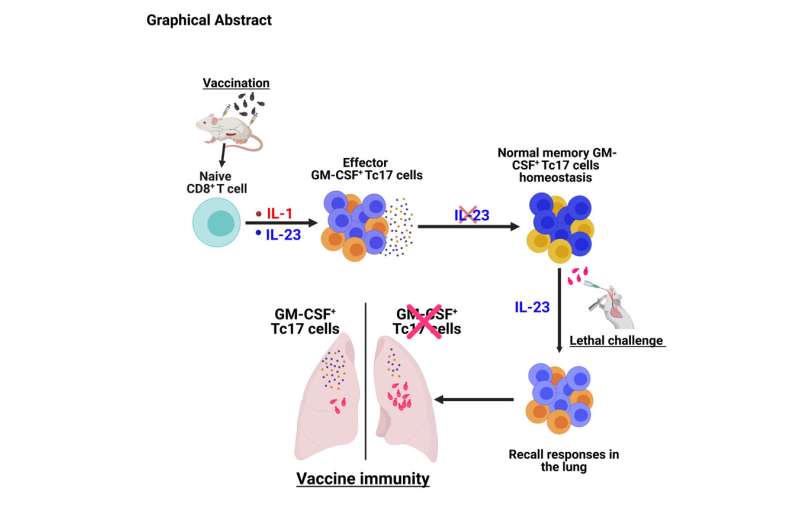Study identifies key T cells for immunity against fungal pneumonia

Researchers at the University of Illinois College of Veterinary Medicine have demonstrated in a mouse model that a specific type of T cell, one of the body's potent immune defenses, produces cytokines that are necessary for the body to acquire immunity against fungal pathogens. This finding could be instrumental in developing novel, effective fungal vaccines.
Despite vaccines being hailed as one of the greatest achievements of medicine, responsible for controlling or eradicating numerous life-threatening infectious diseases, no vaccines have been licensed to prevent or control human fungal infections.
This lack proved especially deadly during the COVID-19 pandemic. In countries where steroids were widely used to suppress inflammation of the lungs, COVID-19 patients with preexisting conditions such as uncontrolled diabetes showed a greater likelihood of developing lethal fungal infections.
T cells could produce protective or pathological response
"A particular type of T cell [TH17 cells] that expresses GM-CSF [granulocyte-macrophage colony-stimulating factor] was linked to greater severity of illness in people infected with the virus that causes COVID-19," said Dr. Som Nanjappa, an assistant professor of immunology at the University of Illinois.
"Our study shows that IL-17A+ CD8+ T cell (Tc17), which also expresses GM-CSF, is necessary for mediating fungal vaccine immunity without instigating hyperinflammation. So clearly, the antigen specificity of T cells—whether they target viral vs. fungal or bacterial pathogens—has a huge impact on whether they play a protective or detrimental role."
The article, "GM-CSF+ Tc17 cells are required to bolster vaccine immunity against lethal fungal pneumonia without causing overt pathology," appeared in Cell Reports on October 25. Dr. Nanjappa's co-authors on the study are Srinivasu Mudalagiriyappa, a former graduate student now a scientist with Insmed Incorporated, a global biopharmaceutical company focused on serious and rare diseases; Jaishree Sharma, a graduate student in the Department of Pathobiology; and Miranda D. Vieson, a Clinical Associate Professor in the Department of Pathobiology as well as a boarded veterinary pathologist in the college's Veterinary Diagnostic Laboratory.
T cells for fungal vaccine immunity
In the study, colonies of mice were given an experimental fungal vaccine. The mice were then exposed to virulent fungal pathogen to cause lethal pulmonary infection. Researchers could determine the necessity of GM-CSF+ Tc17 cells to mediate vaccine immunity. Further, they found that IL-1 and IL-23 cytokines are necessary for eliciting GM-CSF+ Tc17 cells to vaccine. While IL-23 is dispensable for the long-term memory homeostasis of these cells, it is essential for vaccine immunity against pulmonary fungal infection.
This study identifies a beneficial subset of T cells for fungal vaccine immunity that bolsters efforts to develop a vaccine platform containing suitable adjuvants to potentiate such a T cell subset.
"In line with this, we have identified a functional phenotypic marker that could be targeted to enhance this subset to augment vaccine efficacy," said Dr. Nanjappa.
More information: Srinivasu Mudalagiriyappa et al, GM-CSF+ Tc17 cells are required to bolster vaccine immunity against lethal fungal pneumonia without causing overt pathology, Cell Reports (2022). DOI: 10.1016/j.celrep.2022.111543
















